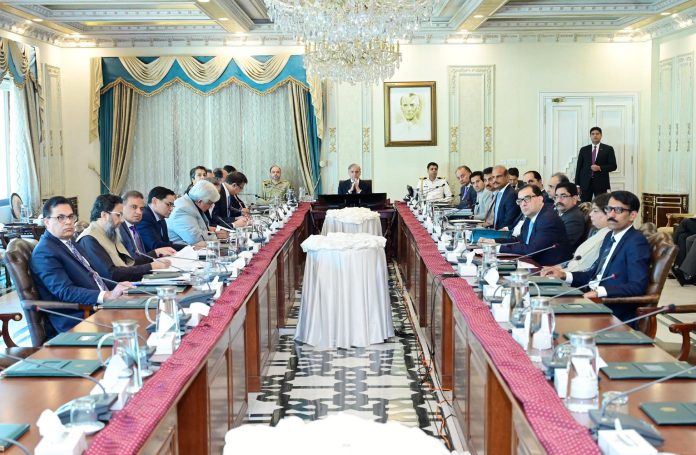
———— Receives briefing by the Ministry of Finance on recent discussions with an IMF delegation
———— Mulls over govt’s plan to unveil new economic plan
———— Directs Finanace Ministry to expand tax regime
By Asghar Ali Mubarak
ISLAMABAD: Prime Minister Shehbaz Sharif on Monday directed authorities to intensify measures against tax evaders, underscoring the importance of accountability in driving economic stability.
Chairing a meeting to review the country’s economic situation, PM Shehbaz was briefed by the Ministry of Finance on recent discussions with an International Monetary Fund (IMF) delegation.
The prime minister said Pakistan is moving towards economic stability, attributing progress to government-led initiatives that have bolstered investor confidence and revitalised the stock market.
He highlighted a sharp decline in inflation, which fell from 38% to 7%, and a reduction in the interest rate from 22% to 15%, fostering business growth and creating new employment opportunities.
“Our economy is stabilising, and we are prioritising public relief,” said PM Shehbaz. “We are taking all necessary steps to fulfil promises made to the people.”
The prime minister also commended Punjab’s leadership for agricultural reforms while announcing a focus on increasing exports and remittances to strengthen foreign exchange reserves.
Calling for stricter action against tax evaders, PM Shehbaz said, “Tax evasion and its enablers will be held accountable. For national progress, everyone must shoulder their share of responsibility.”
Earlier, akistan’s tax shortfall and a delay in materialising foreign loans have emerged as the main concerns of the International Monetary Fund (IMF) while Punjab’s new agriculture income tax law is still not fully aligned with the federal legislation and in deviation to the National Fiscal Pact.
But Punjab Information Minister Azma Bukhari denied that there was any breach of the pact, claiming that the newly-amended provincial law was addressing the needs of the National Fiscal Pact.
In addition to Punjab, the Sindh government was also in violation of the National Fiscal Pact, as it did not show any serious intentions to implement the pact during meetings with the IMF, sources said. But compared to Sindh, Punjab at least has passed the law, although a muted one.
At the end of the five-day sudden visit, the global lender shared its assessment with Pakistani authorities on Friday. The mission led by Nathan Porter had arrived for staff-level talks due to some “recent developments” with regards to the implementation of the $7 billion package.
The sources said that an underperformance by the Federal Board of Revenue (FBR) and a delay in finalising the loans for filling the $2.5 billion gap were the two major concerns. Pakistan was again asked to contact Riyadh and Beijing for securing oil on deferred payments and debt rescheduling, respectively.
At the conclusion of the talks, the Pakistani authorities claimed that the IMF had not yet given its final verdict on the issue of bridging revenue shortfalls and it would send the “asks” after consultations with its headquarters in Washington.
In addition, the IMF had concerns about the delay in the privatisation of the power distribution companies (DISCOs) and also remained stuck to its condition of amending the Pakistan Sovereign Wealth Fund Act by the end of December.
The IMF emphasised on amending the gas sector definition of circular debt and ensuring its monthly reporting. Both the power and the petroleum divisions do not regularly report these numbers.
The IMF also found flaws in the implementation of the National Fiscal Pact, which had been signed by all the five finance ministers to align the income tax rates and transferring some expenditure responsibilities to the provinces.
The sources said that the IMF had asked for developing the property tax and agriculture income tax regime by provinces through legislation in line with the FBR


